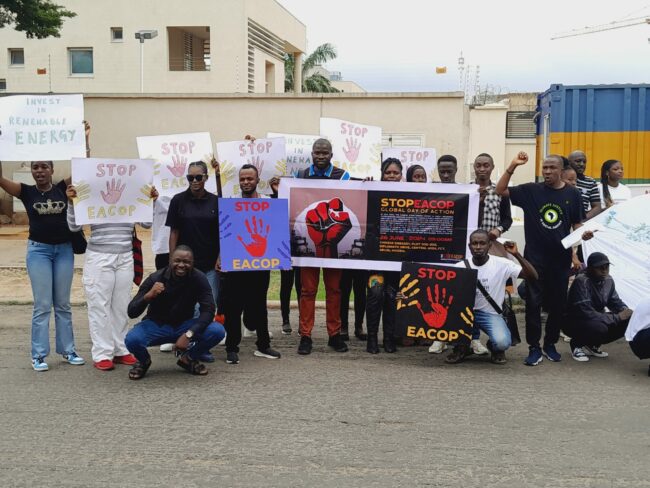A Civil Society Organisation, StopEACOP Coalition, has called on the Chinese government to rescind its decisions to build crude oil pipeline across East African countries.
In an open letter to the Chinese Embassy’s Charge d’affaire Zhang Yi, read by the StopEACOP Nigeria lead, Smith Nwokocha, called on China to stand with people on the right side of history and not finance the EACOP projects.
Nwokocha explained that as a local civil society organisation working alongside people who directly and indirectly have been or will potentially be impacted by the East African Crude Oil Pipeline project and the associated upstream oil projects (the EACOP projects) in Uganda, Tanzania, and the Democratic Republic of the Congo (DRC), together, and alongside partners across the world, operate as the StopEACOP Coalition.
He said: “We are writing to you to express our grave concerns regarding China’s reported support for the harmful EACOP projects.
“There were reports that Chinese President Xi Jinping has given his endorsement to the EACOP project, and that the China Export and Credit Insurance Corporation (Sinosure), the Export-Import Bank of China (China Exim Bank) and several other Chinese banks were considering providing finance and insurance to the EACOP project.”
“Moreover, Industrial and Commercial Bank of China (ICBC) has long been reported as one of the financial advisors of the project. Meanwhile, there are also reports that the Chinese financial institutions are still assessing the risks of the project and have requested due diligence to be conducted.”
“We welcome this effort and would like to share with you the concerns of the affected people and important analysis about the projects’ environmental and social impacts, to support you to better assess the risks of investing in EACOP and make sound decisions.”
“China’s reported support is in stark contrast with the assessments of major global financial institutions, and as a result is being seen as the last resort for saving these deeply controversial projects. As of 26 June 2024, 28 insurance and reinsurance companies, 4 Export Credit Agencies, 27 commercial banks and the African Development Bank have publicly ruled out support for EACOP.”
“Several have explicitly attributed their decision to concerns over EACOP’s ongoing and anticipated environmental and social impacts. For example, Standard Chartered Bank, which was considering financing the project, ultimately declined to do so after conducting an environmental and social due diligence assessment.”
“We are confused as to why China would consider supporting such problematic projects majority owned by the French company TotalEnergies.
“China has taken important action on climate change by committing not to build new coal power plants overseas, and has demonstrated its willingness to step up its global leadership on biodiversity conservation.”
“China has also pledged to support Africa and developing countries to combat climate change. If China supports the EACOP and associated oil field projects, it will seriously undermine the valuable efforts and commitments China has made so far.”
“In fact, the recent reports about China’s potential support for the project are already harming China’s reputation globally, particularly in Africa.
“Funding a project that is estimated to lead to greenhouse gas emissions of 379 million tonnes CO²e and bring serious threats to local livelihoods is not the kind of climate or development partnership African people are asking for.”
“A range of studies by various independent experts, international organisations, as well as local civil society organisations that support the project affected people, have shown that the EACOP project and the associated Tilenga and Kingfisher oil field projects will bring high risks to climate, biodiversity, and RAMSAR wetlands, as well as the livelihoods of local communities and sustainable development of our countries.”
“Over 120,000 individuals are being physically or economically displaced by land acquisition for the EACOP, Kingfisher, and Tilenga oil projects.
“Many of them have already experienced serious impacts to their livelihoods, socioeconomic status, and food security, due to inadequate consultation, prolonged restriction of land use years before the construction of the project, and insufficient compensation as a result of flawed valuation processes.
“Moreover, nearly one third of the proposed pipeline will be built within the basin of Lake Victoria, Africa’s largest freshwater body, endangering the water supply of more than 40 million people.”
“The projects’ impacts on biodiversity and the environment, especially water resources, will also impact the livelihoods of a wider population who rely on the tourism sector and fisheries.
“The fisheries sector in Uganda alone employs over 1.7 million people directly and 3.6 million people indirectly, with Lake Albert and Lake Victoria contributing to more than 80% of the country’s total fish production.”
“In comparison, according to the developers, EACOP and the two oil fields will create only 12,000-13,000 direct jobs during the construction phase, and most of these jobs will no longer be available after the construction is completed.”
“Affected people in Uganda and Tanzania have communicated their concerns to all the potential financial institutions, including Sinosure, China Exim Bank, the reported financial advisor ICBC and other Chinese banks as well as the Chinese government, by sharing their concerns and expert analysis through emails, post and more recently through peaceful action trying to deliver them to the Chinese embassies. These include a petition letter signed by 2,461 affected people in Uganda and another by 2,591.”
“However, their efforts have been met with absolute silence. The Chinese Embassy in Uganda has even repeatedly rejected to receive any of the materials that would help China better assess the risk of supporting the projects.”
“Recently, we have also seen increasing retaliation and repression by the public security of Uganda of people who are critical of the projects. Our representatives were arrested every time trying to peacefully deliver the materials to the Chinese Embassy in Uganda.”
“We therefore, asked our global partners to support our action in Uganda, Tanzania and the DRC, by bringing our messages to your attention.”
ALSO READ THESE TOP STORIES FROM NIGERIAN TRIBUNE
